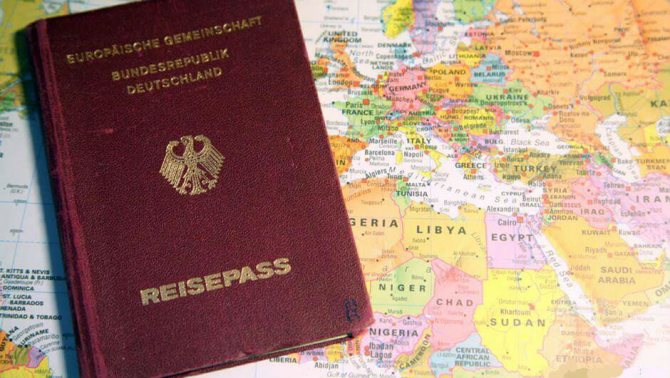Main opportunities for obtaining a German passport
In addition to ethnic origin and the program for the return of Jews to Germany after the Nazi genocide, there are several more accessible options for becoming a full-fledged resident of this country.
Since 2005, the emigration law has introduced several additionally specified situations for obtaining citizenship for foreigners, then these points were slightly refined.
Therefore, you can get the coveted passport:
- by right of birth;
- through marriage;
- under the business emigration program;
- for family reunification;
- in refugee status;
- EU Blue Card;
- adoption of children under eighteen years of age;
- standard naturalization process.
What is dual and multiple citizenship
Bipatrism and multiple citizenship arose back in the days of Roman law: according to it, this is the legal status of a person who has citizenship in several countries, which, in turn, consider him their citizen. Multiple citizenship should be distinguished from dual citizenship, which can arise only as a result of the conclusion between countries of an appropriate international treaty on mutual recognition.
Such agreements, as a rule, are concluded only by countries between which there are historical ties created over centuries, which is why they are rare in international practice. Among the most famous examples are treaties between Great Britain and the countries of the British Commonwealth, between Italy and Argentina, and so on.
If there are no such agreements, each country, in relations with a binational, recognizes him exclusively as its own citizen, without recognizing his second passport on its territory. But if the legislation of the country allows bipatrism, non-recognition does not deprive a citizen of the right to own two passports.
The child has
In practice, for a child to be automatically granted German citizenship, it is necessary that:
- The birth took place in Germany, and one of the biological parents is a citizen of this country.
- The minor was adopted on the territory of a foreign state, and then lived in Germany for 3 years.
- The birth took place in Germany, and the parents are not citizens of this country, but submitted a timely application.
- The child was born in Germany, and both of his parents have the right to permanent residence in the country.
In a situation where the birth took place in Germany, but the parents were passing through the country, citizenship is not automatically granted.
Do you want to be guaranteed to obtain a residence permit, permanent residence, or citizenship in another country? See the rating of reliable migration companies!
Opportunities for obtaining dual citizenship in Germany
Although the question of whether dual citizenship is possible in Germany is mostly answered in the negative, more than 4 million residents of the country still have this status. Conclusion: there are exceptions to every rule.
So, if a German citizen received another citizenship not on his own initiative, but automatically, for example, after marriage, he may have two passports. In addition, the authorities provide the opportunity for ethnic Germans from the CIS countries and other countries to obtain citizenship by birthright, without officially renouncing their previous citizenship.
There is also a precedent of a different nature: in some countries, for example, in Iran, there is no procedure for renouncing citizenship at all; then the German authorities have no choice but to retain their former citizenship for applicants for citizenship from such countries.
In turn, children born in the union of a German and a migrant have the right to receive a German passport. Until 2021, there was a rule: upon reaching the age of 23, these children could decide which citizenship to prefer - Germany or the state of which their parents are nationals. At the beginning of 2021, a rule came into force giving this category of children the opportunity to have two citizenships at once.
But it will not be possible to automatically acquire dual citizenship after marriage to a German. Of course, the spouse of a citizen receives advantages over other applicants for a German passport, for example in terms of reducing the naturalization period. However, one of the conditions for obtaining status is the termination of previous citizenship. This fact can only be confirmed by a certificate from the migration authority of your home country.
The laws are harsh
German citizenship is an attractive and difficult thing to obtain. Germany is not a country open to immigration and does not strive to be so. Without any problems, you can become a German citizen only by right of blood, that is, by being an ethnic German. The naturalization process is eight years of continuous residence in the country.
By marriage, status can be obtained faster, but migration services vigilantly monitor the family well-being of international couples, and at least three years must pass from the date of marriage before the spouse of a German citizen can apply for citizenship.
There are quite high requirements in Germany for knowledge of the language. And against the backdrop of all these difficulties, another one arises - the renunciation of Russian citizenship.
How Germany views the institution of dual citizenship
Before embarking on the complex and lengthy procedure of establishing a new legal connection, you should find out whether Germany recognizes dual citizenship. There are a dozen countries in Europe that have legalized bipatrism. Germany is not one of them.
According to German law, a foreigner who wants to acquire German citizenship must, in most cases, renounce his former citizenship. The same applies to German citizens. When becoming a citizen of another country, a German citizen must cease German citizenship.
The German authorities began talking about the possibility of migrants obtaining dual citizenship back in the early 1990s. Until this time, Germany was against such an institution. The goal of the new integration policy is to simplify the adaptation of migrants into German society, help them preserve property left in their homeland (inheritance, etc.) or facilitate their return home.
Conditions for acquiring German citizenship
Like any other country, Germany takes migration issues seriously. Naturalization is possible only if all conditions are met and there are legal grounds for this. Let's think about how to become a German citizen. This requires at least one of the following reasons:
- the applicant has permission for permanent residence or indefinite stay in the country;
- the applicant has lived legally in Germany for more than 8 years;
- the passport applicant has sufficient income to support a family and does not receive government benefits;
- the foreigner speaks the language and has a certificate (category B1) confirming this;
- the right to citizenship was born in Germany;
- there must be no criminal record either under German law or abroad;
- the immigrant gave up his previous passport.
The last criterion is the completion of the citizenship procedure. The applicant is asked to take an oath and perform other formal rituals.
Required documents
The applicant must have the following documents:
- resident card;
- a document confirming passing the German language test at level B1;
- a document confirming marriage with a German citizen;
- a document confirming no criminal record;
- receipt of payment of the state fee in the amount of 255 euros;
- a document confirming non-receipt of social benefits and benefits from the German government.
Refusal of Russian citizenship
For applicants located in Russia, a general refusal procedure applies. They need to submit a corresponding application and a set of documents to the Department of the Main Internal Affairs Directorate for Migration Issues. The procedure lasts about a year, the final decision is made by the president. If there are no serious grounds for refusal (debts to federal authorities or unfulfilled court obligations), the citizen will receive the appropriate certificate and surrender his passport.
If a citizen lives outside the Russian Federation, the process looks slightly different. The applicant applies to the Russian Consulate and uses a simplified exit procedure. In this case, the waiting period is only 6 months.
How to obtain German citizenship without giving up Russian citizenship
And yet, is it possible to get it in Germany without losing the Russian one? To answer this question, it is necessary to study and analyze the laws of the two countries. Thus, there are “gaps” in the legislation of the Federal Republic of Germany, using which you can have a Russian passport. Russians do not have to give up their passport if the procedure for withdrawing from it may cause difficulties or property losses.
According to § 12 of the German Nationality Act, there are a number of exceptions in which renunciation of foreign citizenship is not required.
These include:
- the laws of the country of origin do not establish procedures for renunciation of citizenship;
- the exit is too long or very expensive;
- the country of origin refuses to satisfy the application for exit;
- naturalization of older people;
- late settlers;
- EU citizens;
- refusal entails a significant infringement of the range of financial and property rights (loss of pension, etc.)
Another way to possess several at the same time could be a situation where a person has received refugee status in Germany and subsequently obtains its citizenship. In this situation, the former is actually preserved and the Germanic is acquired.
Each of the above cases requires documentary evidence of the grounds preventing compliance with the requirements of German laws.
Obtaining citizenship through naturalization
It is possible to obtain German citizenship if you have lived in the country for a long time. A foreigner can come to Germany as a student or to find a job.
A mandatory condition for consideration of documents is staying in the country for 8 years. There is no need to confirm the length of time you have lived - the migration office employees have this information.
To obtain citizenship, you should contact the migration office at your place of registration in Germany and provide the following documents:
- Questionnaire.
- Resident card.
- International passport.
- Confirmation of solvency.
- Apartment rental agreement.
- Medical insurance.
This is the main list of documents for obtaining citizenship. The German authorities have the right to require additional documents for consideration. For example, a credit history may be required.
How to get dual citizenship
There are strict requirements for migrants in Germany. Naturalization is provided for under certain conditions and on certain grounds. The reasons for being able to apply for citizenship are as follows:
- permission has been granted for indefinite residence or permanent residence;
- have sufficient income and do not plan to use government benefits;
- legal residence in the country for 8 years or more;
- knowledge of the language at category B1 level, which is confirmed by a certificate;
- lack of criminal record in this and other states;
- birth in Germany;
- renunciation of previous citizenship.
The candidate is given concessions if he has an excellent command of the German language and understands the federal structure and local way of life no worse than ethnic Germans. In this case, the mandatory period of 8 years is reduced to 6. The final procedure for the applicant is formal rituals and an oath.
After receiving the document, the Russian will have to submit a notification to the FMS within 60 days. If the procedure implied the renunciation of Russian citizenship, there is no need to notify the migration service - the person no longer has anything to do with the country.
Change of citizenship
All democratic states have an institution for voluntary cessation of citizenship. Events can begin at the initiative of the person himself or the authorities of the country of which he is a subject.
If we talk about Russian legislation, then you can apply for termination of citizenship only if you have documents confirming the acquisition or guarantees of obtaining another citizenship (Federal Law dated May 31, 2002 N 62-FZ (as amended on May 1, 2020) “On Citizenship of the Russian Federation” ). According to the provisions of the new Constitution of the Russian Federation of December 12, 1993, Russians cannot be forcibly deprived of their citizenship status.
Is it advisable to have dual citizenship in Germany?
Although the range of exceptions is gradually expanding, in general, the majority of those who want to “join” the benefits that come with the status of a citizen of this prosperous country will have to renounce their citizenship.
To think about whether a German citizen can have dual citizenship, you need to make sure that there are grounds for naturalization at all. Only those who meet the following mandatory requirements will be able to obtain a German passport:
- Permanent residence permit.
- Stay in the country legally for at least 8 years.
- Availability of means for the subsistence of the applicant and his family members.
- Recognition of the laws of the country.
- Successfully passing a language proficiency test.
Given all these difficulties, even before obtaining a second citizenship in Germany, it would be useful for a Russian to weigh whether the benefits received are worth the effort. If your family remains in your home country or business interests remain, it may make sense to begin the naturalization procedure while maintaining your previous civil status. However, if there is little connection with Russia, there will be no particular benefit from having the status of a “dual citizen”.
As much as possible?
Before considering whether citizenship of two countries is allowed at once, it is necessary to highlight the difference in the terms “dual” and “second”. As for the first option, such citizenship is allowed only if an appropriate agreement has been concluded between countries. On the territory of Germany it is allowed to have several nationalities, as in Russia.
If we consider dual citizenship in Russia and Germany, then in principle this cannot happen. The countries did not enter into a corresponding agreement, which is why a Russian has the right to only have a second citizenship in Germany, as is the case with Germans who have the right to receive a Russian passport. However, you are not required to renounce your previous citizenship.

Important! Answering the question whether dual citizenship is possible, we must highlight the fact that in Germany this is available only to certain categories of citizens; as for the Russian Federation, here this is allowed for everyone.
Is it allowed in Germany?
On the territory of this state it is legally possible to be a citizen of several countries at once. This right is reserved for ethnic Germans (who were born and lived their entire lives within Germany), persons with refugee status, Jews (as compensation for genocide), and also for people deprived of citizenship from 1933 to 1945 and nationals of other countries who have lived in Germany for more than 8 years. All other applicants are granted citizenship upon refusal of a previous passport of another state.
In Russia
In such a situation, it is much easier for Russians, since the current legislation is more loyal to the registration of citizenship in a foreign country. According to the current regulatory framework of the country, namely the Constitution of the Russian Federation (Article No. 62), Russian citizens have the right to obtain second citizenship even with a state with which a corresponding agreement has not been concluded.
Do you want to get EU citizenship in 12 months? Take the free test and find out your chances.










